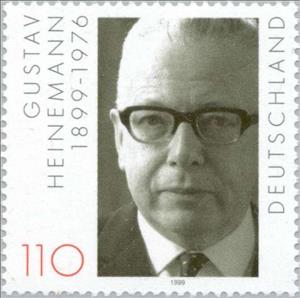Stamp: Heinemann, Gustav (Germany, Federal Republic 1999)
Heinemann, Gustav (Germany, Federal Republic 1999)
15 July (Germany, Federal Republic ) within release Dominikus-Ringeisen work goes into circulation Stamp Heinemann, Gustav face value 110 German pfennig
| Stamp Heinemann, Gustav in catalogues | |
|---|---|
| Michel: | Mi:DE 2067 |
| Yvert et Tellier: | Yt:DE 1899 |
Stamp is square format.
Pres. Gustav Heinemann (1899-1976)Also in the issue Dominikus-Ringeisen work:
- Stamp - Dominikus-Ringeisen work face value 110;
- Stamp - First peace conference face value 300;
- Stamp - Heinemann, Gustav face value 110;
Stamp Heinemann, Gustav it reflects the thematic directions:
A head of state (or chief of state) is the public persona that officially represents the national unity and legitimacy of a sovereign state. In some countries, the head of state is a ceremonial figurehead with limited or no executive power, while in others, the head of state is also the head of government. In countries with parliamentary governments, the head of state is typically a ceremonial figurehead that does not actually guide day-to-day government activities and may not be empowered to exercise any kind of secular political authority (e.g., Queen Elizabeth II as Head of the Commonwealth). In countries where the head of state is also the head of government, the president serves as both a public figurehead and the actual highest ranking political leader who oversees the executive branch (e.g., the President of the United States).
Famous People refers to the fame and public attention accorded by the mass media to individuals or groups or, occasionally, animals, but is usually applied to the persons or groups of people (celebrity couples, families, etc.) themselves who receive such a status of fame and attention. Celebrity status is often associated with wealth (commonly referred to as fame and fortune), while fame often provides opportunities to make money.
Commemorations are a type of religious observance in the many Churches of the Anglican Communion, including the Church of England. They are the least significant type of observance, the others being Principal Feasts, Principal Holy Days, Festivals, and Lesser Festivals. Whereas Principal Feasts must be celebrated, it is not obligatory to observe Commemorations. They are always attached to a calendar date, and are not observed if they fall on a Sunday, in Holy Week, or in Easter Week. In Common Worship Commemorations are not provided with collects or indications of liturgical colour. However, they may be celebrated as Lesser Festivals if local pastoral conditions suggest it.



